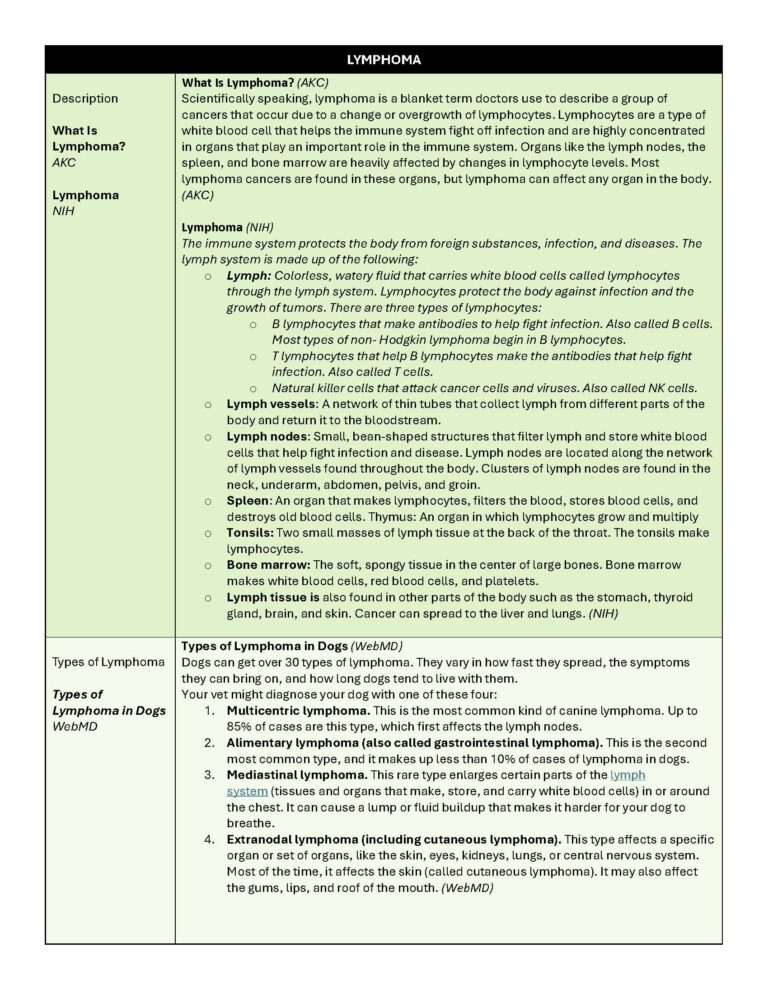Canine Lymphoma
&
Breeds at Risk
Research, Resources & Education
This website is based on research and is NOT created to diagnose your pet.
Each animal is an individual and may exhibit symptoms in a different way.
It is advised that you ALWAYS CHECK WITH YOUR VETERINARIAN for a proper diagnosis and treatment plan.
Please visit Lost Temple Fitness & Cancer for more information of cancer in humans including
What is Cancer and Treatments.
Table of Contents
Canine Lymphoma
Lymphoma in dogs is caused by an overgrowth of lymphocytes., which is a type of white blood cell that helps the immune system fight infection.
Symptoms include reduced appetite, weight loss ,swelling in the face or legs, ncreased thirst, diarrhea, frequent urination and/or trouble breathing.
Treatments depend on the type of lymphoma and can range from chemotherapy, bone marrow transplant, radation or surgery.
What Dogs are at Risk?
Some Dogs that are at Risk due to Genetic Predisposition





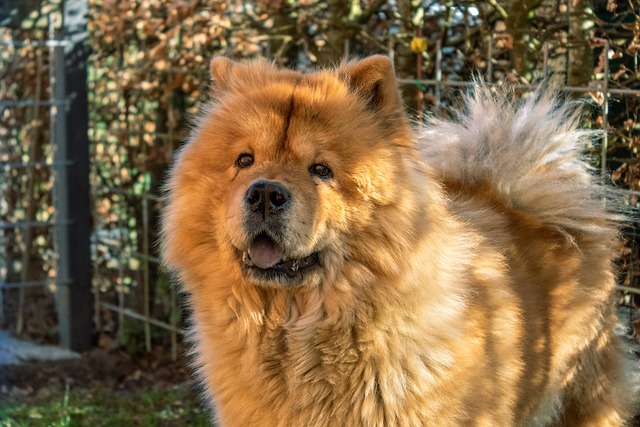


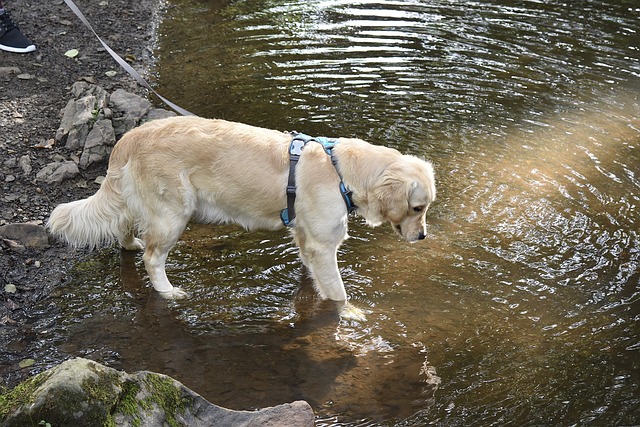

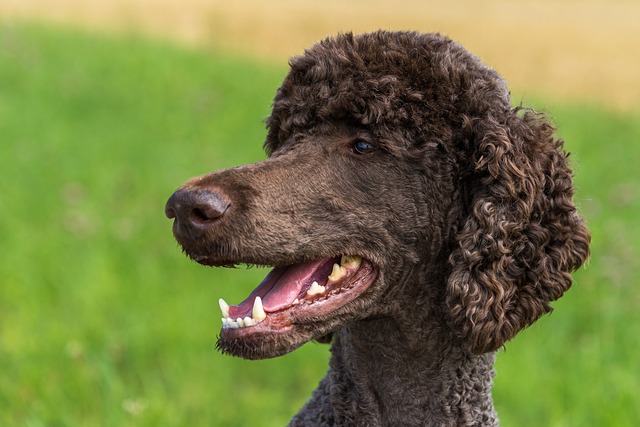
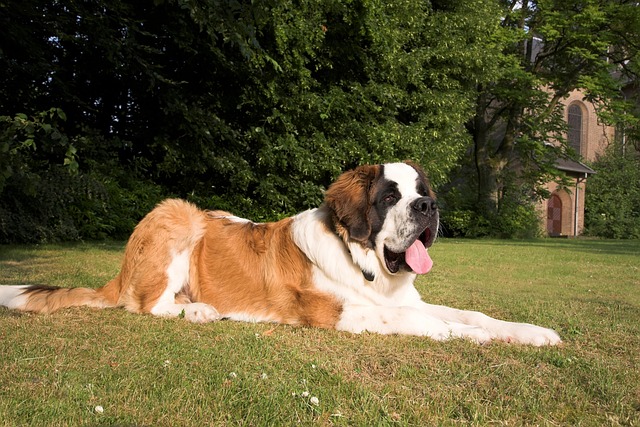
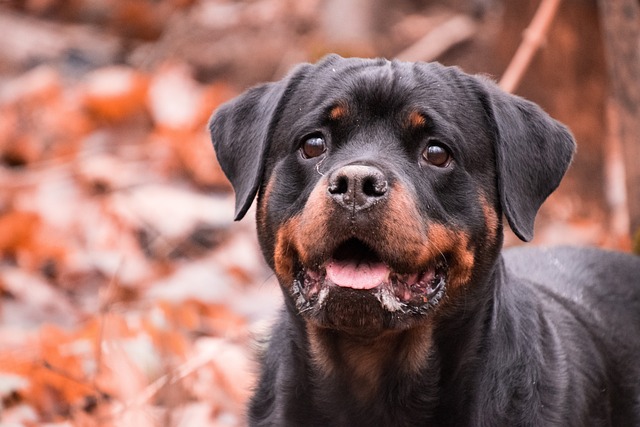
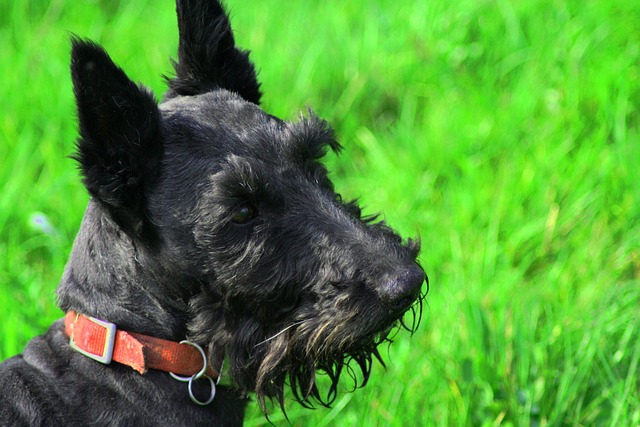


What is Lymphoma and Types?
Learn More about Lymphoma in Humans and General Information at Lost Temple Fitness Cancer & Lymphoma.
What Is Lymphoma? (AKC)
What Is Lymphoma? (AKC)
Scientifically speaking, lymphoma is a blanket term doctors use to describe a group of cancers that occur due to a change or overgrowth of lymphocytes. Lymphocytes are a type of white blood cell that helps the immune system fight off infection and are highly concentrated in organs that play an important role in the immune system. Organs like the lymph nodes, the spleen, and bone marrow are heavily affected by changes in lymphocyte levels. Most lymphoma cancers are found in these organs, but lymphoma can affect any organ in the body. (AKC)
Lymphoma - Human (NIH)
Lymphoma – Human (NIH)
The immune system protects the body from foreign substances, infection, and diseases. The lymph system is made up of the following:
- Lymph: Colorless, watery fluid that carries white blood cells called lymphocytes through the lymph system. Lymphocytes protect the body against infection and the growth of tumors. There are three types of lymphocytes:
- B lymphocytes that make antibodies to help fight infection. Also called B cells. Most types of non- Hodgkin lymphoma begin in B lymphocytes.
- T lymphocytes that help B lymphocytes make the antibodies that help fight infection. Also called T cells.
- Natural killer cells that attack cancer cells and viruses. Also called NK cells.
- Lymph vessels: A network of thin tubes that collect lymph from different parts of the body and return it to the bloodstream.
- Lymph nodes: Small, bean-shaped structures that filter lymph and store white blood cells that help fight infection and disease. Lymph nodes are located along the network of lymph vessels found throughout the body. Clusters of lymph nodes are found in the neck, underarm, abdomen, pelvis, and groin.
- Spleen: An organ that makes lymphocytes, filters the blood, stores blood cells, and destroys old blood cells. Thymus: An organ in which lymphocytes grow and multiply
- Tonsils: Two small masses of lymph tissue at the back of the throat. The tonsils make lymphocytes.
- Bone marrow: The soft, spongy tissue in the center of large bones. Bone marrow makes white blood cells, red blood cells, and platelets.
- Lymph tissue is also found in other parts of the body such as the stomach, thyroid gland, brain, and skin. Cancer can spread to the liver and lungs. (NIH)
Types of Lymphoma in Dogs (WebMD)
Types of Lymphoma in Dogs (WebMD)
Dogs can get over 30 types of lymphoma. They vary in how fast they spread, the symptoms they can bring on, and how long dogs tend to live with them.
Your vet might diagnose your dog with one of these four:
- Multicentric lymphoma.This is the most common kind of canine lymphoma. Up to 85% of cases are this type, which first affects the lymph nodes.
- Alimentary lymphoma (also called gastrointestinal lymphoma).This is the second most common type, and it makes up less than 10% of cases of lymphoma in dogs.
- Mediastinal lymphoma. This rare type enlarges certain parts of the lymph system (tissues and organs that make, store, and carry white blood cells) in or around the chest. It can cause a lump or fluid buildup that makes it harder for your dog to breathe.
- Extranodal lymphoma (including cutaneous lymphoma).This type affects a specific organ or set of organs, like the skin, eyes, kidneys, lungs, or central nervous system. Most of the time, it affects the skin (called cutaneous lymphoma). It may also affect the gums, lips, and roof of the mouth. (WebMD)
Lymphoma Videos
YouTube Videos that help explain Lymphoma in Dogs
Disclaimer:
This is for research only and Lost Temple Pets does not endorse any video presented on this website.
It is advised that you ALWAYS CHECK WITH YOUR VETERINARIAN for a proper diagnosis and treatment plan.
Causes
Etiology and Epidemiology of Lymphoma in Dogs (Merck Manual)
Etiology of Lymphoma in Dogs (Merck Manual)
The underlying causes of malignant lymphoma in dogs remain incompletely characterized, and it is likely multifactorial.
- Potential contributing factors include infectious viruses or bacteria, environmental contamination with phenoxyacetic acid herbicides or other chemical exposures, strong magnetic fields, chromosomal abnormalities, and immune dysfunction.
- Advanced genetic studies have revealed that lymphoma in dogs can be molecularly distinguished and categorized into discrete groups that correlate with biological aggressiveness.
Epidemiology of Lymphoma in Dogs
Lymphoma is the most common hematopoietic neoplasm in dogs, with a reported incidence approaching 0.1% of susceptible dogs.
- Lymphoma in dogs usually occurs in middle-aged to older dogs.
- There is no significant association with sex.
- Some breeds may be at increased relative risk (eg, Boxer, Rottweiler, Golden Retriever); however, any breed can be affected.
Symptoms
Lymphoma in Dogs Symptoms (Web MD)
Lymphoma in Dogs Symptoms (Web MD)
The most common sign you might notice is one or more firm, enlarged lymph nodes on your pet’s body. When they’re enlarged, they feel like hard, rubbery lumps under the skin. They’re not painful. They could show up in places like:
- Under the neck or jaw
- Behind the knees
- In front of the shoulders
- In the armpits
If you notice lumps like these on your dog, ask your vet to check them, even if your pet seems fine otherwise.
Lymphoma can also bring on symptoms like:
- Reduced appetite
- Feeling tired
- Weight loss
- Swelling in the face or legs
- Increased thirst
- More frequent peeing
- Diarrhea
- Throwing up
- Trouble breathing
Dogs with cutaneous lymphoma have red, itchy, dry, and flaky patches of skin. As the disease gets worse, the skin becomes thick and moist with open sores. You may notice lumps in your dog’s skin.
Other skin conditions can cause similar symptoms. Your vet may first treat the symptoms as an allergy or infection. If your dog doesn’t improve, a skin biopsy is the next step That’s the only way to diagnose cutaneous lymphoma.
Symptoms of gastrointestinal lymphoma are:
- Weight loss
- Watery diarrhea
- Throwing up
If your dog has lymphoma, they may not seem sick. Or they may have only mild symptoms, like feeling tired and not wanting to eat. Your dog’s symptoms and how serious they are will depend on:
- How advanced the cancer is
- Which organs are affected
- The type of lymphoma (Web MD)
Testing and Staging
Diagnosing Lymphoma in Dogs (AKC)
Diagnosing Lymphoma in Dogs (AKC)
Once cancer is suspected, typically after observing an enlarged lymph node, the veterinarian will obtain a tissue sample from the affected organ.
- The most common diagnostic tool is a fine-needle aspiration. This extracts a sample of a dog’s lymph nodes or organs to be evaluated through a cytology exam (examining a single type of cell) or by a biopsy (examining a section of tissue).
Some veterinarians recommend “staging tests” or will refer you to an oncologist following a lymphoma diagnosis to determine how far the disease has progressed.
- These tests help veterinarians understand your dog’s overall condition (as well as the type of lymphoma) and may include blood tests, urinalysis, X-rays, abdominal sonograms, and bone marrow aspiration (removing a bit of fluid bone marrow).
There are five stages of lymphoma, depending on which sites are affected and the degree to which the cancer is localized or spread throughout the body:
- Stage I: Involves a single lymph node
- Stage II: Affects multiple lymph nodes in one region
- Stage III: All lymph nodes affected (generalized)
- Stage IV: Involves lymph nodes and organs such as the liver, spleen, or chest
- Stage V: Involves the bone marrow (AKC)
Treatment
Lymphoma in Dogs Treatment (WebMD)
Lymphoma in Dogs Treatment (WebMD)
Learning that your dog has cancer can be heartbreaking, but treatment could extend their life.
The most effective treatment of lymphoma in dogs is chemotherapy.
- There are many chemo drugs. The ones your vet suggests for your pet will depend on the type of lymphoma they have.
- Some chemo drugs are given to dogs through an IV line, and some are given by mouth.
- Dogs often get a combination of these meds.
- Your dog may need weekly chemo treatments for several months.
One treatment for dogs with multicentric lymphoma is based on something called the CHOP protocol used to treat lymphomas in humans.
- If your dog doesn’t respond to chemotherapy, that particular chemo drug might not work on the cancer. That’s called drug resistance.
- Over time, most lymphomas become drug-resistant. Your vet can try treatments to reverse drug resistance.
Side Effects
Dogs don’t usually get very sick from chemo or lose their hair the way some humans do. Certain breeds do lose hair, though, including sheepdogs, poodles, and Bichon Frise.
Some common side effects are:
- Not wanting to eat
- Being less active
- Vomiting or diarrhea that lasts 1 or 2 days (WebMD)
Treatment and Outlook (Merck Manual)
Treatment and Outlook (Merck Manual)
Treatment of high-grade, multicentric canine lymphoma with chemotherapy using a combination of drugs is often successful, with more than 90% of all dogs achieving complete remission (a complete reduction of tumors). Individual treatment plans vary with respect to the drugs used, dosage, and frequency and duration of treatment.
- With chemotherapy, the expected survival time for dogs with B-cell lymphoma is about 12 months. For dogs with T-cell lymphoma, expected survival times are shorter (6 months).
- Dogs that do not respond to the usual drugs may improve when other treatment plans are used. These alternate plans may include other drugs or radiation.
- In recent years, treatment has included both initial and longterm medications. Now, similar or improved responses are seen with shorter term therapies, and chemotherapy is often stopped once remission is reached.
- Bone marrow transplants may even be an option for some dogs.
- Treating other forms of lymphoma is often more difficult. Alimentary lymphoma, if concentrated in one area, can be treated effectively with surgery to remove the tumor, together with combination chemotherapy. However, if lymphoma has spread throughout the intestinal tract, the response to treatment is not as good and survival times are shorter (often less than 3 months).
- The use of combination chemotherapy with or without radiation can give dogs with mediastinal lymphoma considerable improvement in survival times and quality-of-life scores. Dogs with an abnormally high level of calcium in the blood, a condition often associated with mediastinal lymphoma, are also less likely to live for long.
- Lymphoma involving other extranodal sites, such as the skin, can be managed with surgery, radiation, and chemotherapy as appropriate; however, the disease often stops responding to treatment.
- Dogs with low-grade lymphoma tend to do well and with chemotherapy can survive longer than two years. (Merck Manual)
References
References
AKC – Lymphoma in Dogs: Symptoms, Diagnosis, and Treatment
American Kennel Club
By Nandini Maharaj Updated: Aug 25, 2023
https://www.akc.org/expert-advice/health/lymphoma-in-dogs/
Merck Manual – Malignant Lymphoma in Dogs
By Timothy M. Fan, DVM, PhD, DACVIM, Department of Veterinary Clinical Medicine, College of Veterinary Medicine, University of Illinois
Reviewed/Revised Dec 2017
https://www.merckvetmanual.com/dog-owners/blood-disorders-of-dogs/malignant-lymphoma-in-dogs
NIH – National Cancer Institute – Adult Non-Hodgkin Lymphoma Treatment https://www.cancer.gov/types/lymphoma/patient/adult-nhl-treatment-pdq
NIH – National Cancer Institute (main page) Lymphoma—Patient Version – https://www.cancer.gov/types/lymphoma
VCA Animal Hospital- Lymphoma in Dogs
By Malcolm Weir, DVM, MSc, MPH; Catherine Barnette, DVM
https://vcahospitals.com/know-your-pet/lymphoma-in-dogs
WebMD – Lymphoma in Dogs
Written by Evan Starkman, Shawna Seed
Medically Reviewed by Amy Flowers, DVM on February 20, 2024
Cancer/Breed Chart
| BREED | BRAIN | HEMANGIO- SARCOMA | LYMPHOMA | MAMMARY TUMORS | MAST CELL TUMOR | MELANOMA | NASAL TUMOR | ORAL | OSTEOSARCOMA | PERIANAL/ ANAL SAC | SOFT TISSUE SARCOMA | TRANSITIONAL (TCC) / UROTHELIAL (UC) |
|---|---|---|---|---|---|---|---|---|---|---|---|---|
| Airedale Terrier | Lymphoma | Melanoma | Nasal Tumor | Soft Tissue Sarcoma | TCC or UC | |||||||
| Basset Hound | Hemangiosarcoma | Lymphoma | Nasal Tumor | Soft Tissue Sarcoma | ||||||||
| Bulldog, English | Brain | Lymphoma | Mast Cell Tumor | Perianal/Anal Sac | Soft Tissue Sarcoma | |||||||
| Bullmastiff | Lymphoma | Mast Cell Tumor | Soft Tissue Sarcoma | |||||||||
| St. Bernard | Lymphoma | Osteosarcoma | Soft Tissue Sarcoma | |||||||||
| Golden Retriever | Brain | Hemangiosarcoma | Lymphoma | Mast Cell Tumor | Melanoma | Oral | Osteosarcoma | Perianal/Anal Sac | Soft Tissue Sarcoma | |||
| Labrador Retriever | Hemangiosarcoma | Lymphoma | Mast Cell Tumor | Melanoma | Nasal Tumor | Oral | ||||||
| Scottish Terrier | Brain | Lymphoma | Melanoma | Nasal Tumor | Oral | Soft Tissue Sarcoma | TCC or UC | |||||
| Boxer | Brain (Glioma) | Hemangiosarcoma | Lymphoma | Mammary Tumor | Mast Cell Tumor | Oral | Osteosarcoma | Soft Tissue Sarcoma | ||||
| Beagle | Hemangiosarcoma | Lymphoma | Mast Cell Tumor | Perianal/Anal Sac | TCC or UC | |||||||
| West Highland White Terrier | Lymphoma | |||||||||||
| Chow Chow | Lymphoma | Melanoma | Oral | |||||||||
| Poodle, Standard | Lymphoma | Melanoma | Nasal Tumor | Oral | ||||||||
| Rottweiler | Lymphoma | Oral | Osteosarcoma | |||||||||
| Poodle, Toy | Lymphoma | Mammary Tumor | Melanoma | Nasal Tumor | ||||||||
| Yorkshire Terrier | Lymphoma | Mammary Tumor | ||||||||||
| German Shepherd | Hemangiosarcoma | Lymphoma | Mammary Tumor | Melanoma | Nasal Tumor | Oral | Osteosarcoma | Perianal/Anal Sac | ||||
| Poodle, Miniature | Lymphoma | Mammary Tumor | Melanoma | Nasal Tumor | Oral | |||||||
| Affenpinscher | ||||||||||||
| Afghan Hound | ||||||||||||
| Alaskan Malamute | Perianal/Anal Sac | |||||||||||
| American Eskimo, Toy and Standard | ||||||||||||
| American Foxhound | ||||||||||||
| American Pitt Bull Terrier | Hemangiosarcoma | |||||||||||
| American Staffordshire Terrier | ||||||||||||
| American Water Spaniel | ||||||||||||
| Anatolian Shepherd Dog | ||||||||||||
| Australian Cattle Dog | TCC or UC | |||||||||||
| Australian Shepherd | TCC or UC | |||||||||||
| Australian Terrier | ||||||||||||
| Basenji | ||||||||||||
| Bearded Collie | ||||||||||||
| Beauceron | ||||||||||||
| Bedlington Terrier | ||||||||||||
| Belgian Groenendael | ||||||||||||
| Belgian Malinois | ||||||||||||
| Belgian Tervuren | ||||||||||||
| Bernese Mountain Dog | Hemangiosarcoma | Melanoma | Soft Tissue Sarcoma | |||||||||
| Bichon Frise’ | TCC or UC | |||||||||||
| Black and Tan Coonhound | ||||||||||||
| Black Russian Terrier | ||||||||||||
| Bloodhound | Soft Tissue Sarcoma | |||||||||||
| Boerboel | ||||||||||||
| Border Collie | Brain | TCC or UC | ||||||||||
| Border Terrier | ||||||||||||
| Borzoi | Osteosarcoma | |||||||||||
| Boston Terrier | Brain | Mast Cell Tumor | Melanoma | Soft Tissue Sarcoma | ||||||||
| Bouvier des Flandres | Soft Tissue Sarcoma | |||||||||||
| Briard | ||||||||||||
| Brussels Griffon | ||||||||||||
| Bull Terrier | Mast Cell Tumor | Melanoma | ||||||||||
| Bull Terrier, Miniature | Mast Cell Tumor | Melanoma | ||||||||||
| Cairn Terrier | ||||||||||||
| Canaan Dog | ||||||||||||
| Cane Corso (Italian Mastiff) | ||||||||||||
| Caucasian Shepherd | ||||||||||||
| Cavalier King Charles Spaniel | Perianal/Anal Sac | |||||||||||
| Chesapeake Bay Retriever | Melanoma | |||||||||||
| Chinese Crested | ||||||||||||
| Chinese Shar-Pei | Mast Cell Tumor | Soft Tissue Sarcoma | TCC or UC | |||||||||
| Clumber Spaniel | ||||||||||||
| Curly Coated Retriever | ||||||||||||
| Dalmation | Hemangiosarcoma | |||||||||||
| Dandie Dinmont Terrier | ||||||||||||
| Dogo Argentino | ||||||||||||
| Dogue de Bordeaux | ||||||||||||
| English Foxhound | ||||||||||||
| English Toy Spaniel AKA King Charles Spaniel | ||||||||||||
| Field Spaniel | ||||||||||||
| Finnish Spitz | ||||||||||||
| Flat-Coated Retriever | Hemangiosarcoma | |||||||||||
| Fox Terrier, Smooth | Mast Cell Tumor | |||||||||||
| Fox Terrier, Toy | Mast Cell Tumor | |||||||||||
| Fox Terrier, Wire | TCC or UC | |||||||||||
| French Bulldog | ||||||||||||
| German Pinscher | ||||||||||||
| German Wirehaired Pointer | ||||||||||||
| Glen of Imaal Terrier | ||||||||||||
| Great Dane | Brain | Osteosarcoma | Soft Tissue Sarcoma | |||||||||
| Great Pyrenees | ||||||||||||
| Greater Swiss Mountain Dog | ||||||||||||
| Greyhound | Brain (Meningioma) | Hemangiosarcoma | Osteosarcoma | Soft Tissue Sarcoma | ||||||||
| Harrier | ||||||||||||
| Havanese | ||||||||||||
| Ibizan Hound | ||||||||||||
| Irish Terrier | ||||||||||||
| Irish Water Spaniel | ||||||||||||
| Irish Wolfhound | Osteosarcoma | |||||||||||
| Italian Greyhound | Brain | Hemangiosarcoma | ||||||||||
| Japanese Chin | ||||||||||||
| Keeshond | Nasal Tumor | |||||||||||
| Kerry Blue Terrier | ||||||||||||
| Komondor | ||||||||||||
| Kuvasz | ||||||||||||
| Lakeland Terrier | ||||||||||||
| Leonberger | Osteosarcoma | |||||||||||
| Lhasa Apso | TCC or UC | |||||||||||
| Lowchen | ||||||||||||
| Manchester Terrier Toy | ||||||||||||
| Manchester Terrier, Standard | ||||||||||||
| Mastiff | Brain | |||||||||||
| Miniature Pincher | ||||||||||||
| Neapolitan Mastiff | ||||||||||||
| Newfoundland | ||||||||||||
| Norfolk Terrier | ||||||||||||
| Norwegian Buhund | ||||||||||||
| Norwegian Elkhound | Brain | Nasal Tumor | ||||||||||
| Norwich Terrier | ||||||||||||
| Nova Scotia Duck Tolling Retriever | ||||||||||||
| Old English Sheepdog | Brain | |||||||||||
| Otterhound | ||||||||||||
| Papillon | ||||||||||||
| Parsons Russell Terrier | TCC or UC | |||||||||||
| Pekingese | Brain | |||||||||||
| Petit Basset Griffon Vendeen (PBGV) | ||||||||||||
| Pharaoh Hound | ||||||||||||
| Plott Hound | ||||||||||||
| Polish Lowland Sheepdog | ||||||||||||
| Pomeranian | ||||||||||||
| Portuguese Water Dog | Brain | Hemangiosarcoma | ||||||||||
| Presa Canario | ||||||||||||
| Pug | Brain | Mast Cell Tumor | Soft Tissue Sarcoma | |||||||||
| Puli | ||||||||||||
| Pyrenean Shepherd | ||||||||||||
| Rhodesian Ridgeback | Mast Cell Tumor | Soft Tissue Sarcoma | ||||||||||
| Saluki | ||||||||||||
| Samoyed | Perianal/Anal Sac | |||||||||||
| Schipperke | ||||||||||||
| Schnauzer, Miniature | Mast Cell Tumor | Melanoma | Perianal/Anal Sac | Soft Tissue Sarcoma | ||||||||
| Schnauzer, Standard | Mast Cell Tumor | Melanoma | Soft Tissue Sarcoma | |||||||||
| Sealyham Terrier | ||||||||||||
| Shiba Inu | ||||||||||||
| Shih Tzu | Brain | |||||||||||
| Siberian Husky | Perianal/Anal Sac | |||||||||||
| Silky Terrier | ||||||||||||
| Skye Terrier | Hemangiosarcoma | |||||||||||
| Soft-Coated Wheaten Terrier | ||||||||||||
| Spinone Italiano | ||||||||||||
| Staffordshire Bull Terrier | Mast Cell Tumor | |||||||||||
| Sussex Spaniel | ||||||||||||
| Swedish Vallhund | ||||||||||||
| Tibetan Mastiff | ||||||||||||
| Tibetan Spaniel | ||||||||||||
| Tibetan Terrier | ||||||||||||
| Tosa | ||||||||||||
| Vizsla | Melanoma | |||||||||||
| Weimaraner | Mast Cell Tumor | |||||||||||
| Welsh Corgi, Cardigan | ||||||||||||
| Welsh Corgi, Pembroke | ||||||||||||
| Welsh Springer Spaniel | ||||||||||||
| Welsh Terrier | ||||||||||||
| Whippet | Hemangiosarcoma | TCC or UC | ||||||||||
| Wirehaired Pointing Griffon | ||||||||||||
| Akita (American) | Oral | |||||||||||
| Collie, Rough / Smooth Coat | Brain (Meningioma) | Nasal Tumor | Oral | TCC or UC | ||||||||
| Gordon Setter | Melanoma | Oral | ||||||||||
| Irish Setter | Melanoma | Oral | Osteosarcoma | Soft Tissue Sarcoma | ||||||||
| Schnauzer, Giant | Mast Cell Tumor | Melanoma | Oral | |||||||||
| Scottish Deerhound | Brain | Melanoma | Oral | Osteosarcoma | TCC or UC | |||||||
| Shetland Sheepdog | Nasal Tumor | Oral | TCC or UC | |||||||||
| Brittany | Mammary Tumor | |||||||||||
| Chihuahua | Mammary Tumor | Melanoma | ||||||||||
| English Cocker Spaniel | Mammary Tumor | |||||||||||
| English Setter | Mammary Tumor | |||||||||||
| English Springer Spaniel | Mammary Tumor | Melanoma | Perianal/Anal Sac | |||||||||
| Maltese | Mammary Tumor | |||||||||||
| Pointer | Hemangiosarcoma | Mammary Tumor | ||||||||||
| Cocker Spaniel (American) | Mammary Tumor | Mast Cell Tumor | Melanoma | Oral | Perianal/Anal Sac | |||||||
| Dachshund | Brain | Mammary Tumor | Mast Cell Tumor | Oral | Perianal/Anal Sac | |||||||
| Doberman Pinscher | Brain | Mammary Tumor | Melanoma | Oral | Osteosarcoma | |||||||
| German Shorthaired Pointer | Mammary Tumor | Nasal Tumor | Oral |
